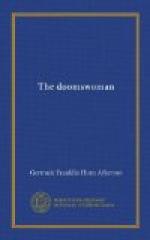“Ay, but do not live too hard! It hurts down into the core and marrow.”
XX.
While we were eating supper, a dozen Indian girls were gathered about a table in one of the large rooms behind the house, busily engaged in blowing out the contents of several hundred eggs and filling the hollowed shells with cologne, flour, tinsel, bright scraps of paper. Each egg-was then sealed with white wax, and ready for the cascaron frolic of the evening.
We had been dancing, singing, and talking for an hour after rosario, when the eggs were brought in. In an instant every girl’s hair was unbound, a wild dive was made for the great trays, and eggs flew in every direction. Dancing was forgotten. The girls and men chased each other about the room, the air was filled with perfume and glittering particles, the latter looking very pretty on black floating hair. Etiquette demanded that only one egg should be thrown by the same hand at a time, but quick turns of supple wrists followed each other very rapidly. To really accomplish a feat the egg must crash on the back of the head, and each occupied in attack was easy prey.
Chonita was like a child. Two priests were of our party, and she made a target of their shaven crowns, shrieking with delight. They vowed revenge, and chased her all over the house; but not an egg had broken on that golden mane. She was surrounded at one time by caballeros, but she whirled and doubled so swiftly that every cascaron flew afield.
The pelting grew faster and more furious; every room was invaded; we chased each other up and down the corridors. The people in the court had their cascarones also, and the noise must have been heard at the Mission. Don Guillermo hobbled about delightedly, covered with tinsel and flour. Estenega had tried a dozen times to hit Chonita, but as if by instinct she faced him each time before the egg could leave his hand. Finally he pursued her down the corridor to her library, where I, fortunately, happened to be resting, and both threw themselves into chairs, breathless.
“Let us stay here,” he said. “We have had enough of this.”
“Very well,” she said. She bent her head to lift a book which had fallen from a shelf, and felt the soft blow of the cascaron.
“At last!” said Estenega, contentedly. “I was determined to conquer, if I waited until morning.”
Chonita looked vexed for a moment,—she did not like to be vanquished,—then shrugged her shoulders and leaned back in her chair. The little room was plainly furnished. Shelves covered three sides, and the window-seat and the table were littered with books. There were no curtains, no ornaments; but Chonita’s hair, billowing to the floor, her slender voluptuous form, her white skin and green irradiating eyes, the candlelight half revealing, half concealing, made a picture requiring no background. I caught the expression of Estenega’s face, and determined to remain if he murdered me.




